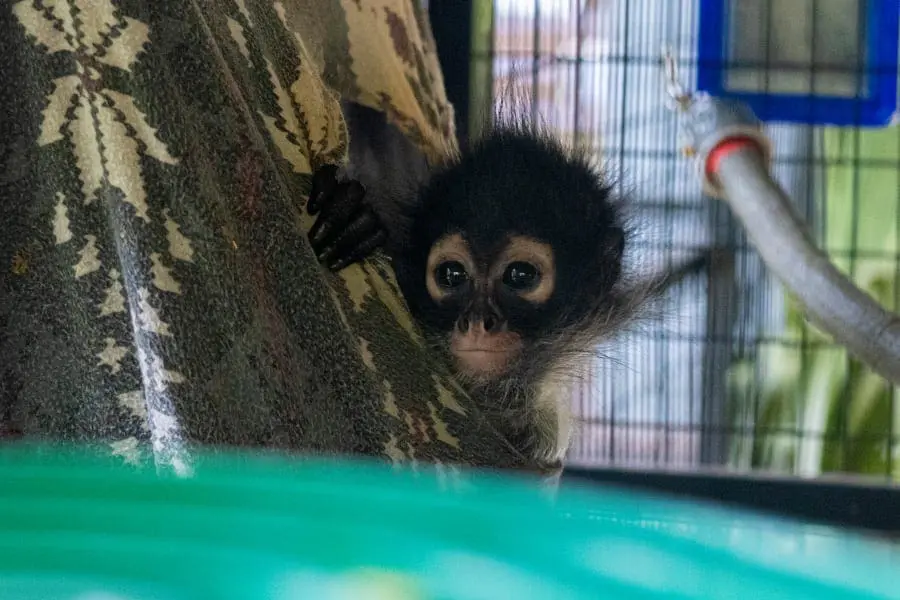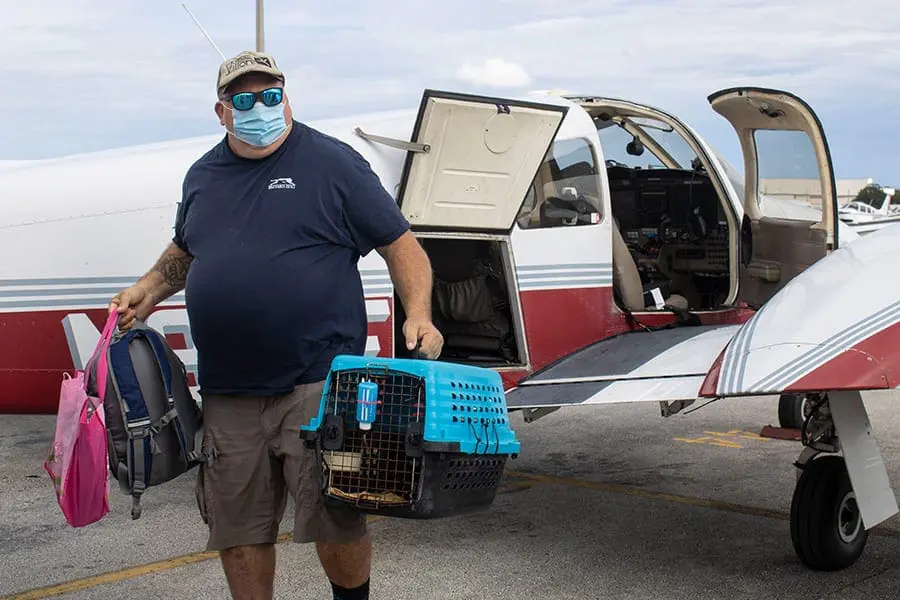

The newest member of our troop is slowly settling in.
Back in June, U.S. Customs and Border Protection officers made a startling discovery inside the center console of a truck at the United States-Mexico border in Hidalgo, Texas: a baby black-handed spider monkey.
The now-seven-month-old, yet-to-be-named male, who was likely poached from the wild and is a victim of the exotic pet trade, was turned over to United States Fish and Wildlife Service and taken to Dallas Zoo for short-term care. Animal care professionals deemed the spider monkey unsuitable for return to the wild and began their search for his “forever home.”
Because of our long-standing history with this species and success in maintaining a multigenerational troop, we were chosen to house him.
We soon confronted a major hurdle: getting him from Texas to Florida. Given the ongoing pandemic, commercial airlines are understandably not transporting nonhuman primates at the moment. Florida Institute of Technology Aviation graciously offered the use of a four-seat plane to retrieve the spider monkey and bring him back to the Zoo.
While the crew—consisting of two pilots and curator of animals Dave Quavillon—prepared for takeoff from Orlando Melbourne International Airport on Thursday, a truly extraordinary series of events began to unfold back at the Zoo. Seventeen-year-old spider monkey Tika was going into labor! Sadly, excitement over this new arrival was tempered upon the realization that the baby was stillborn.
But then Tika went into labor again—turns out she had been pregnant with twins! Keepers observed Tika with bated breath, uncertain if this little one would survive birth. Fortunately, the second baby emerged from the womb alive.
It wasn’t time to celebrate just yet. Tika was still carrying the deceased infant in her hands, paying more attention to it than the living one—the latter of which was struggling to hold on because they were being weighed down by the placenta still attached to the other end of the umbilical cord (an unusual occurrence this long after birth).
Keepers prepared to call Tika into her night house for an emergency sedation so our veterinarians could sever the baby’s cord. As if on cue, the cord and placenta detached, and this procedure was, fortunately, not necessary.
We collected the deceased infant and discovered it had not fully developed. Twin births are rare in spider monkeys, and at least one of the babies typically does not survive birth. This was quite an ordeal for Tika, but she and the surviving newborn (whose sex is not yet known) both seem to be doing well. We are keeping a close eye on this pair, preparing to step in if needed.
As the plane headed west, the pilots hit a patch of rough weather and made an unplanned stop in Longview, Texas to wait out the storm. They made it to Dallas on Thursday evening and, after a much-needed night’s rest, Quavillon headed to the local zoo to pick up the spider monkey in the morning. The rest of the trip went smoothly, and the plane returned to Melbourne on Friday afternoon.

Quavillon deboards the plane with its most precious cargo.
The confiscated spider monkey (who likely had not interacted with other members of his species since he was poached) was driven to the Zoo and placed in an area where he could see, smell and hear the rest of the spider monkeys, and vice versa. He has spent short amounts of time sharing physical space with a few of them, but he still seems more comfortable around humans than with other spider monkeys. It may take a few weeks, but we are optimistic that he will become a fully integrated member of the troop.
Dr. Darby Proctor of Florida Institute of Technology, her students and our keepers have tracked the troop’s behavioral dynamics for many years, and they are studying the relationship-building process to learn more about the social structure of spider monkeys.
The illegal wildlife trade is one of the world’s largest black-market industries—along with drug, firearm and human trafficking—and one of the main reasons why the black-handed spider monkey is endangered. If you’d like to help put a stop to this devastating practice, check out the Wildlife Trafficking Alliance’s tips for consumers and Legislative Action Center.
